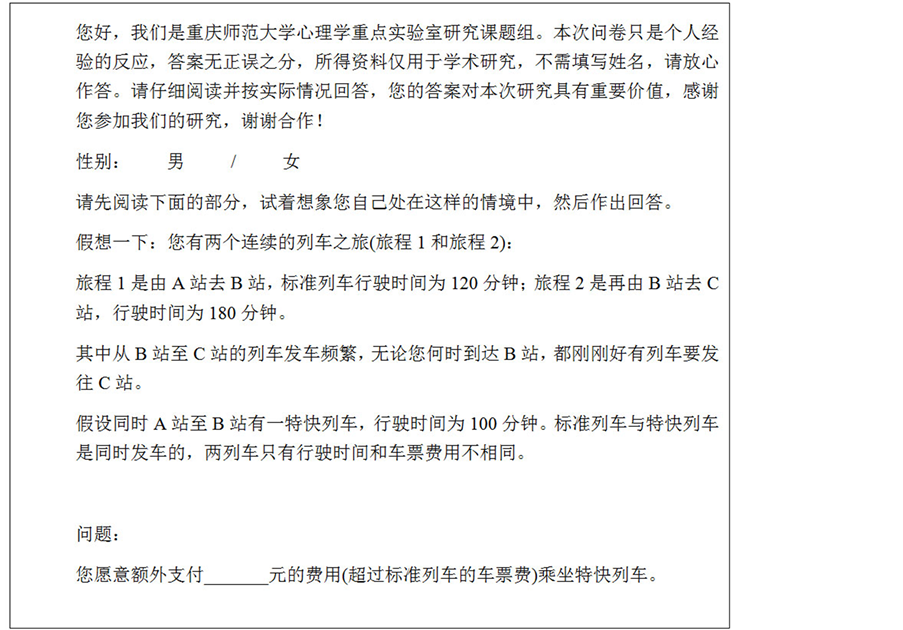1. 引言
在传统行为经济学中的“理性人”假设已经不足以支撑实际应用了,而心理账户的提出进一步打破了“理性人”假设。 Thaler (1980) 在研究沉没成本效应(sunk costeffect)时,认为人们当前的决策容易受已经付出成本的影响,这是因为人们将过去的付出与将来的付出综合在一个账户中进行考虑,据此,他把这种内隐的账户系统称为“心理账户系统”(psychological accounting system)。
心理账户系统有不同的表现形式,包括金钱心理账户、时间心理账户、情感心理账户等。而在进行决策权衡时,又有不同的权衡条件,以往研究通常是在金钱心理账户下进行讨论,而权衡条件是花掉时间、体力等来节省金钱,例如,要不要考虑花30分钟时间到另外一家商店买到比现在这家便宜15块的书籍。而本研究主要介绍心理账户系统的另一表现形式——“花金钱来节省时间”的时间心理账户。
1.1. 研究背景及目的
大量的行为决策的文献为心理账户的存在提供了证据。而目前研究的一个重点在于探讨心理账户在不同条件下的适用性。其中,大多数研究所考虑的条件是金钱账户下的心理账户效应。
关于时间与金钱条件下的决策权衡这一研究主题,在 Duxbury等(2005) 的研究当中,考虑的决策权衡的条件却与大多数研究相反,从“花时间来节省金钱”转变为了“花金钱来节省时间”,这样,人们的决策账户就变成了时间心理账户。
Duxbury等(2005) 的这篇文献改进了 Kahneman和Tversky (1984) 的研究方法,同时使用花金钱来节省时间和花时间来节省金钱两种方法研究人们的决策偏好是不是更多受局部账户的影响,而受局部账户影响表示心理账户效应存在。研究发现,当是金钱心理账户时,人们的决策偏好更多受到局部账户的影响,而是时间心理账户时,人们的决策偏好不会受局部账户的影响。 Duxbury等(2005) 的研究证实了金钱心理账户下,人们的决策偏好受到了局部账户的影响,这也与大多数研究结果保持一致。
而当人们的账户为时间心理账户的时候,人们的决策偏好不会受到局部账户的影响。这一实验并没有被后来的研究所重复,也就是说这一结果并未得到更多研究的证实。而本次研究的一个目的就是要验证这样一个结果是否可靠。
基于这样一个结果, 张军伟等(2010) 认为时间的模糊性导致了人们在决策时不会通过相对优惠值即局部心理账户来进行感知1。我们的另一个研究目的也在此,探讨是否由于人们对时间的感知相比金钱更为模糊,以使得他们在时间账户下进行决策权衡时不会用到局部心理账户影响。
在 France Leclerc等(1995) 的研究中,也涉及了时间与金钱决策权衡的实验,在实验当中,当时间作为心理账户的时候,人们仍然使用了局部心理账户。这样的结果与 Duxbury等(2005) 的实验结果并不一致,在之后的讨论部分将进行进一步说明。
1.2. 心理账户
我们引用 France Leclerc等(1995) 的研究中所涉及的一个实验来说明人们在做决策时是如何运用心理账户系统的,并介绍心理账户系统的构成以及心理账户效应如何存在的(实验总人数N = 168)。
情景1. 想象你将要购买两张不同的火车票:一张去往城市A,一张去往城市B。去往城市A的标准列车需要乘坐5个小时,去往城市B的标准列车需要乘坐1个小时。这两列列车去往的目的地不同,但他们的票价是一致的。当你购票时,你被告知有特快列车开往城市A,需要乘坐4小时45分钟,但需要你额外补足2美美元的差额,请问你愿你支付这两美元购买特快列车车票吗?
YES [33%]; NO [67%]
情景2. 想象你将要购买两张不同的火车票:一张去往城市A,一张去往城市B。去往城市A的标准列车需要乘坐5个小时,去往城市B的标准列车需要乘坐1个小时。这两列列车去往的目的地不同,但他们的票价是一致的。当你购票时,你被告知有特快列车开往城市B,需要乘坐45分钟,但需要你额外补足2美美元的差额,请问你愿你支付这两美元购买特快列车车票吗?
YES [58%]; NO [42%]
1.2.1. 心理账户系统的构成
Kahneman和Tversky (1984) 提出人们对结果的评价涉及到三种账户:最小账户(minimal account)、局部账户(topical account)和综合账户(comprehensive account)。最小账户是指结果的绝对差异,局部账户是指结果与参照水平相比较的差异,而综合账户是指所有账户的总体差异,包括现有资产、未来收入以及其他可能的收入等因素。 Kahneman和Tversky (1984) 提出人们总是会自动运用局部账户进行加工,即人们对结果的评价总是基于一个参照水平,而不是绝对水平。
以下通过 France Leclerc等(1995) 的研究中所涉及的两个情景来说明三个账户。
1) 最小账户(minimal account):就是不同方案所优惠的绝对值。在本实验中的最小账户都是2美元的车票差额,两个情景没有变化。
2) 局部账户(topical account):也可称为相对账户。在实验情境1与情景2中,“局部账户”分别为A列车的5小时和B列车的1小时,其中实验情景1在A列车上节省15分钟,实验情景2在B列车上节省15分钟。
3) 综合账户 (comprehensive account):综合账户就是总消费账户,该实验的综合账户为时间消费,共6小时。
对三个心理账户进行权衡,会产生两种节省值,其中最小账户与局部账户的比值为相对节省值(relative saving),最小账户与综合账户的比值为绝对节省值(absolute saving)。
1.2.2. 心理账户效应
以上两个方案,总支出都是一致的(两张标准列车车票价格相同),两者的效益都是节约2美元或者节约15分钟时间。按照理性消费的原则,效益不变,情景的改变不会导致人们决策的改变,两种情境下选择“花金钱来节省时间”和“花时间来节省金钱”的人数比例应该一致。
但结果表明,两种情境下选择情况的比例并不一致,因为他们的价值评估来自两个独立的局部帐户,个体会从局部账户所产生的相对节省值而非综合账户所产生的绝对节省值来决策。即人们如此决策:在物品原价相同的基础上,同量的节省在相对节省率越高的项目上越有吸引力。
这个效应就被称为心理账户效应。
在之前 France Leclerc等(1995) 提到的两个情景当中,研究者让人们选择了“花金钱来节省时间”。在所重复 Duxbury等(2005) 的研究当中,考虑的权衡条件也将是“花金钱来节省时间”,但所设置的情景将会有所不同,详细介绍见第二部分以及情景问卷。
1.2.3. 心理账户效应存在的满足条件
为了探究实验中被试在做决策时是否存在心理账户效应,需要满足以下条件(仅针对时间心理账户而言):
1) 心理账户为时间心理账户;
2) 决策权衡为“花金钱来节省时间”;
3) 绝对节省值一定。
绝对节省值指的是最小账户,相对节省率指的是局部账户,总时间指的是综合账户,在实验当中,与之对应的自变量因变量将会做进一步说明。
1.3. 实验预期
在测试条件之下,实验1的预期与 Duxbury等(2005) 研究的实验结果一致,即在反向经典条件下,不存在心理账户效应;实验2之中,高分组在反向经典条件2下存在心理账户效应,低分组不存在心理账户效应。
2. 实验1
实验1为对 Duxbury等(2005) 的其中一个实验反向经典条件下即“花金钱来节省时间”这一条件下的重复。
2.1. 假设
1Ho:绝对节省值不变,相对节省率变化时,被试付出的金钱数额没有显著差异(即不存在心理账户效应)。
2.2. 方法
在之前 France Leclerc等(1995) 提到的两个情景当,让人们选择了“花金钱来节省时间”。在所重复 Duxbury等(2005) 的研究当中,考虑的权衡条件也将是“花金钱来节省时间”,但所设置的问卷情景将会有所不同。
由于实验1是重复研究,这里只对被试构成、问卷施测过程等进行介绍,其研究方法详细内容请参见Mental accounting and decision making: Evidence under reverse conditions where money is spent for time saved (Duxbury等,2005) 。
实验分为四组,每名被试只接受一次实验处理,即仅回答一份问卷上的所有问题。
2.2.1. 被试
从重庆师范大学选取被试152名,剔出无效问卷17份(其中排除付出金钱数额高于100元和0元的被试),最终得到135份有效问卷。其中男生65人,女生70人。
2.2.2. 工具
采用 Duxbury等(2005) 研究中的实验1的反向经典条件下的实验情景问卷。
2.2.3. 程序
本研究的所有数据均采用spss17.0软件进行分析处理。
数据采集使用方便取样的方法,在重庆师范大学图书馆随机发放问卷。问卷样例如下所示。

2.2.4. 变量设置
本实验分为两个自变量,如下表1,绝对节省值有两个水平,分别为20分钟和40分钟;相对节省率有两个水平,分别为16.67%和33.33%。因变量为被试愿意额外支付的金钱数额,在表2中已换算成平均值。
2.3. 结果分析
表2为不同绝对节省水平下,被试在相对节省率上的独立样本t检验结果。由此表可以看出,在绝对节省水平一定的情况下,表现在相对节省值上的差异并不明显,且分别为在绝对节省水平为20分钟时,平均值差异为2.91元,而且在绝对节省水平一定的时候,随着相对节省水平的提高,被试愿意付的钱反而减少;绝对节省水平为40分钟时,平均值差异为7.8元,虽然他们之间的差距增大了,但被试愿意付的钱还是随着相对节省率的上升呈现下降趋势。
根据被试在各种水平下所给出的值,对此分别对绝对节省水平和相对节省水平进行了多因素方差分析,结果如表3所示。由此表可以看出,绝对节省水平的主效应不显著,相对节省水平的主效应不显著以及绝对节省与相对节省之间相互作用不显著。
2.4. 讨论
在反向情景中,被试需要考虑他们为了节省时间准备花多少钱。此决策情景和 Duxbury (2005) 的研究

Table 1. Experimental parameter with relative and absolute saving levels
表1. 相对和绝对节省水平的实验参数

Table 2. Mean test on relative saving levels
表2. 不同相对节省水平的均值检验

Table 3. ANOVAs with absolute and relative saving levels
表3. 绝对节省水平和相对节省水平的方差分析
相同,在那项研究中,在他们设计的经典条件下节约的钱越多被试愿意花的时间也就越多,证明了心理账户的存在。但是在反向条件下,即要花钱来买时间的时候则不成立了,心理账户效应不存了。在本次研究中,分析本次反向情境问卷得出数据发现,绝对节省水平的主效应不显著(p > 0.213, N = 135);发现相对节省水平的主效应不显著(p > 0.180, N = 135);也发现绝对节省水平与相对节省水平之间相互作用不显著(p > 0.539, N = 135),而且我们研究的结论与之前 Duxbury等(2005) 实验研究结果相一致,数据呈现出了相同的趋势,同时也就证明了在反向情境中心理账户效应不存在,成功支持了原假设1Ho。所以,与 Duxbury (2005) 实验的研究结果一致,无论在绝对节省的何种水平,目前的研究都证明了在“所花的钱”与“所节省的时间”之间进行权衡协调(花钱买时间)时是不存在心理账户效应的。
虽然本实验结果与 Duxbury (2005) 实验的研究结果一致,最直接的原因在于数据过于离散所致。对于额外变量的控制,这是进一步实验的改进之处。在施测的过程中,也反应出来该情景问卷设计上的问题,它本身并不能很严格的控制额外变量,有诸多被试在施测时反映不能很好的理解问卷的意思而无法作答。因此,限制实验情景的条件将是以后研究需要尝试改进的。同时,对于选取的被试, Duxbury (2005) 的实验设置激励机制,而我们在进行时并没有设置这一环节,而且十分必要的是要了解他们乘坐火车的经验,没有设置这一项限制导致我们在回收问卷时剔出了许多极端数据。
尽管数据较为离散,两个实验都没有交互作用,但值得一提的是,与我们所重复的实验结果一致的是:绝对节省值保持不变,高相对节省率(33.33%)下被试所付出的金钱数额却比低节省率下的要少。我们可以对此理解为:长途列车行程,单位时间的所花票额要比短途列车行程中单位时间所花的票额要多。
3. 实验2
实验1在实验2的基础上区分了高时间价值感和低时间价值感的被试在此种决策权衡条件下是否心理账户的情况。
3.1. 假设
2Ho(a):绝对节省值不变,相对节省率变化时,低时间价值感的被试付出的金钱额度没有显著差异。
2Ho(b):绝对节省值不变,相对节省率变化时,高时间价值感的被试付出的金钱额度没有显著差异。
3.2. 方法
实验2分为两个步骤,其中情景问卷内容相同。步骤一通过青少年时间管理倾向量表筛选出高分组低分组两组,步骤二把高低分两组分别进行两个实验,每名被试只接受一次实验处理,即仅回答一份问卷上的所有问题。
3.2.1. 被试
从重庆师范大学选取被试107人,剔除无效问卷26份(其中排除付出金钱数额高于100元和0元的被试),最终得到有效问卷81份。其中男生32人,女生49人。
3.2.2. 工具
实验2也采用 Duxbury等(2005) 研究中的实验1的反向经典条件下的实验情景问卷。同时,从黄希庭和张志杰编制的青少年时间管理倾向量表中抽取个人取向的时间价值感这一维度共10道题,用以筛选出时间价值感高的被试与低的被试,并从时间控制这一维度中抽取时间优先级这一子维度共5道题作为筛选被试的辅助性参考标准。
1) 青少年时间管理倾向量表
黄希庭,张志杰(2001) 根据我国大学生的实际情况,编制适合我国大学生的时间管理倾向量表,为高校教学管理提供有效测评工具。量表采用自编的《大学生时间管理倾向量表》,对256名大学生进行问卷调查。因素分析表明,大学生时间管理倾向包括优先级、反馈性、计划性、时间分配、设置目标、社会取向的时间价值感、个人取向的时间价值感、时间管理效能、时间管理行为效能9个因子,9个因子可以解释总体方差的55.513%,表明结构效度较高,并且验证性因子分析表明9个因素与构想模型拟合较好 (X2/df = 1.963, NFI=0.975, IFI = 0.936, GFI = 0.927, CFI = 0.954, RMSEA = 0.061)。量表的内部一致性系数为0.845,各维度的内部一致性系数为0.712~0.822。以上表明,大学生时间管理倾向量表的信效度指标较好,可以有效测量我国大学生的时间管理倾向。
3.2.3. 程序
采用方便取样的方法,在重庆师范大学图书馆随机发放问卷。本研究的所有数据均采用spss17.0软件进行分析处理。
3.2.4. 变量设置
该实验固定了实验1中的绝对节省值,如表4,绝对节省值仅为20分钟,唯一自变量为相对节省率,分为两个水平,分别为16.67%和33.33%。因变量为被试愿意额外支付的金钱数额,在表5中已换算成平均值。
3.3. 结果分析
把被试在时间价值感维度这10道题的总分由高到低进行排序,以35分为界,(35分为高分组)得分高的一半为高分组被试,得分低的一半为低分组被试。
表5为高分组低分组分别在不同相对节省率下的独立样本t检验结果(绝对节省值为20分钟)。由此表可以看出高分组被试与低分组被试在不同的相对节省率上所付出的金钱数额均无显著差异。
3.4. 讨论
本研究把时间观念或是时间模糊性的指标通过时间价值感的高低来进行量化,是否具有可行性,还有待进一步的证实。即是否时间价值感高的被试在时间心理账户下的决策权衡时就能对时间概念更加明确,从而在决策时偏好于通过局部账户相对性的特点来进行考虑。这也是实验结果不显著的原因之一。如何区分被试的时间观念,进一步的研究可以考虑以下几个问题:
训练被试的时间观念;
修改所设想的情景或问卷叙述的措辞;
采用预测性更高的量表测量被试在时间认知方面的水平;
另外,在这个假设之上,采用青少年时间管理倾向量表筛选出的不同时间价值感的被试是可信的,时间价值感中两个子维度社会取向和个人取向的克隆巴赫阿尔法系数分别达到0.70和0.73,而重测信度分别达到0.75和0.80。
在之前详细介绍 France Leclerc等(1995) 的实验当中,和本研究的实验2一样,被试是在时间心理账户上进行的决策权衡即“花时间节省金钱”,但在他们的实验当中,存在心理账户效应,其中很重要的原因是问卷所设置的情景的差异。其一在于本实验是列车旅程的情景,而 France Leclerc等(1995) 的实验是买火车票的情景,那么买票这一情景,很可能会使被试把时间明确化、价值化;其二在于本实验的两列车是连续旅程,而 France Leclerc等(1995) 的实验所购票的列车分别开往不同的地点,两列车行程上相互独立。可能Leclerc的决策情景提供了一个聚焦机制3,使得参与者易于把两个旅程看成两个明显不同的实体(因此激活了局部计算),甚至可能发生一些相当大时间的分离 (Duxbury等,2005) 。同时,值得注

Table 4. Experimental parameter with relative and absolute saving levels
表4. 相对和绝对节省水平的实验参数

Table 5. Mean test on relative saving levels
表5. 不同相对节省水平的均值检验
意的是, France Leclerc等(1995) 的实验中规定了两列车车票价格相等,而在本实验中却没有提到列车价格的问题,并在措辞上把列车的两列路程用“旅程”一词来表示,更有可能暗示被试这两列车行驶的前提是去旅行,而对于旅行,大多数的被试是不愿意花费更多金钱来赶时间的,他们更愿意悠闲地进行,这样便有可能使得被试对行程的时间概念变得模糊。
4. 总结
重复 Duxbury等(2005) 实验,两者实验结果一致,即在反向经典条件下做决策权衡时不存在心理账户效应,而区分了时间价值感高的被试与低的被试后,两者在反向经典条件下做决策权衡时均不存在心理账户效应。
NOTES
1我们认为这种不一致的原因可能在于,当是金钱的心理账户时(节省金钱而需要花费时间),金钱的价值是稳定的,所以人们对金钱的相对优惠值(局部账户)会相对敏感,进而人们的决策偏好会更多受局部账户的影响,而当是时间的心理账户时(节省时间而需要花费金钱),时间的价值本身就具有模糊性,所以人们对时间的相对优惠值不会敏感,进而人们在决策时不会通过相对优惠值来进行感知。
2经典条件即“花时间来节省金钱”,来自于 Kahneman和Tversky (1984) 的经典“夹克–计算机”问题:
问题1(a). (N = 93)想象你在购买一件125美元的夹克衫和一个15元的计算器。这个计算器业务员通知你,你想购买的计算器在另一分行的店是卖10美元,位于开车走20分钟的地方。你是否会去其他商场买计算器?
YES [68%]; NO [32%]
问题1(b). (N = 88)想象你购买的是一件15美元的夹克衫和一个125美元的计算器。计算器的推销员通知你,你想购买减价出售120元的计算器在另一分行的店,位于开车20分钟时程以外的地方。你是否会去其另一个分店?
YES [29%]; NO [71%]
3见 Bonini和Rumiati (1996, 2002) 。